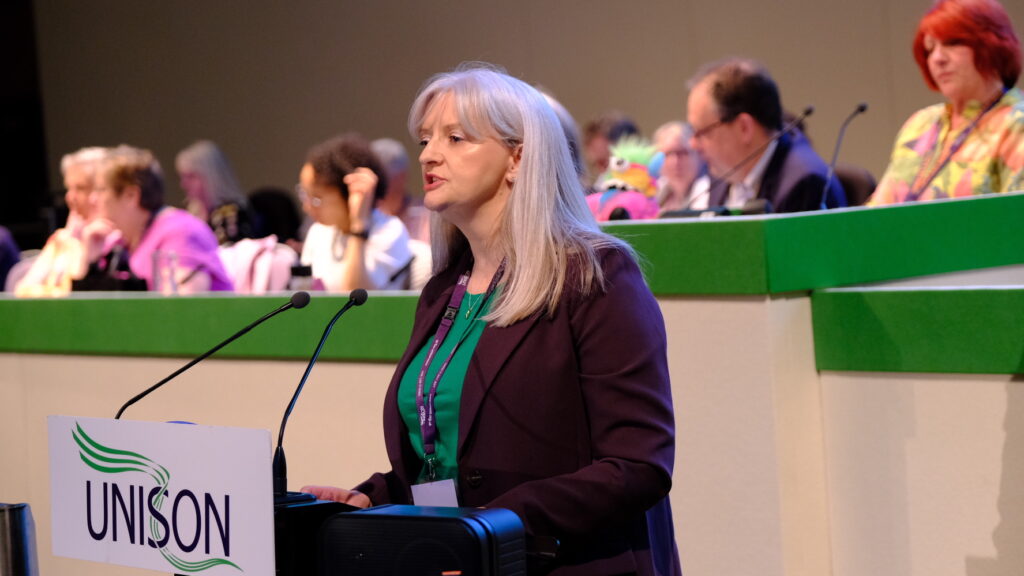Images: Jess Hurd
Pay talk dominated conference business this morning (Tuesday) at UNISON’s annual health conference in Bournemouth.
The morning started with general secretary Christina McAnea taking the opportunity to invite representatives from all health branches who secured a strike mandate in their pay disputes over the last year, to take to the stage, where they received an impassioned standing ovation from delegates (pictured above).
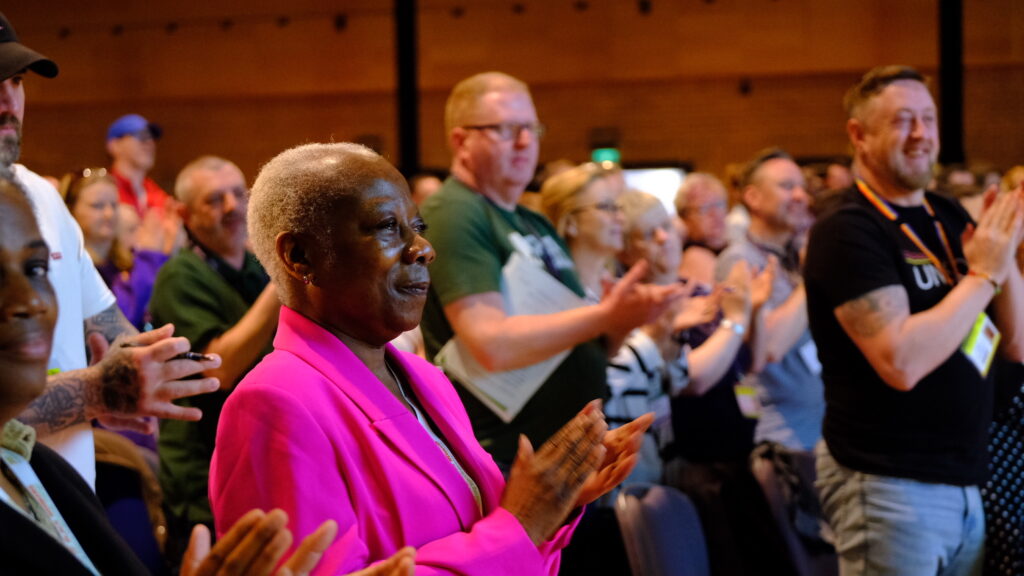
Conference business then started with an emergency motion on the recent NHS pay offer and the response of the health unions to it.
Moving the motion, Wilma Brown, chair of the health service group executive (SGE), said the motion was “about the months of hard work and sacrifice it takes to run successful action.
“It’s about the members willing to lose a day’s pay to go on strike. I want to pay tribute to everyone involved in building to strike action.”
She spoke of the decisive results in UNISON’s consultation on the new offer, which returned a 74% accept vote on a turnout of over 50%.
She said that this year, at conference, it was “essential to be honest. First of all about the offer, because you wont be able to find anyone here who says that this is all health workers deserve.” But also highlighting that “we wont know for certain what will happen next year until all unions have declared their results. But this motion lays out our plan.”
She also called on conference to “build on what we’ve learned in getting mandates for strike action.” And highlighted the increased levels of participation in the recent pay consultation saying: “This stands us in great stead for the future.”
The motion noted the ‘particular significance of the talks to NHS staff Northern Ireland’ due to the fact that there are no sitting ministers in place in NI to make NHS funding decisions.
Stephanie Green from UNISON Northern health branch noted that: “UNISON Northern Ireland were the first members of the union to begin strike action.
“But conference will be aware that NI has no functioning executive. The Tory government wants to use us as pawns in their political game. Well, no more. Watch this space, we ask for you solidarity as we take a strong stance on this in the days and weeks ahead. We will not be fourth class citizens.”
Speaking for the motion Sam Kimberly said: “At the end of the day, we are not just here to represent us, we are here to represent those with no voice, the lowest paid, the members who don’t have time to attend meetings, who can’t afford to attend meetings.
“This is a democracy, the members have accepted the offer, we now need to get on and get the money in members pockets as soon as possible.”
The motion carried, calling upon the service group to declare UNISON’s accept mandate to the NHS staff council and explore the potential to achieve a joint position with the other health unions and seek confirmation from the government that the offer will be implemented at the earliest opportunity.
Flat rate pay uplifts: our approach to pay justice
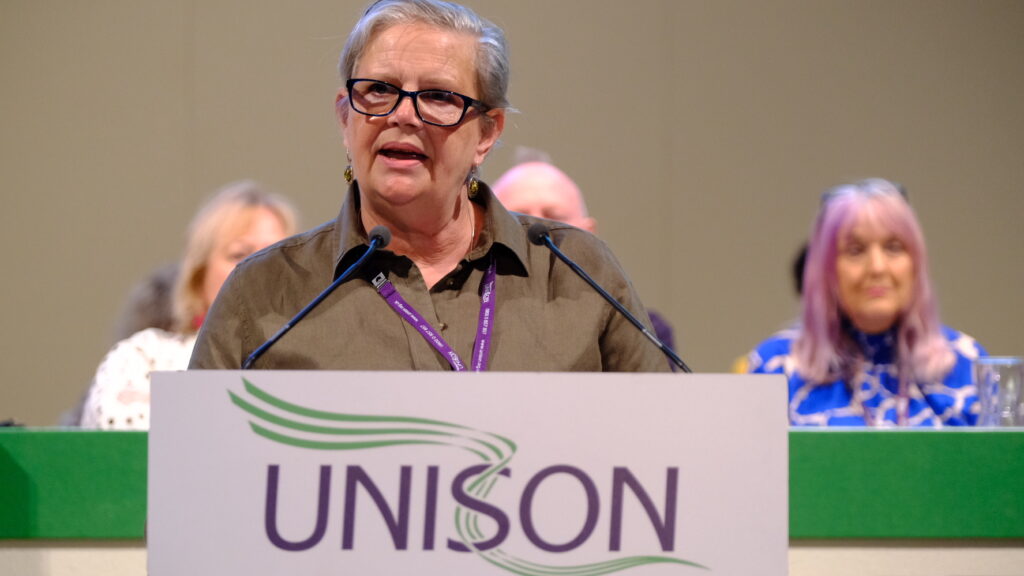
Conference then turned its attention to a motion re-affirming the union’s commitment to seeking flat rate pay increases in the health sector.
The motion noted that percentage pay awards, applied equally, increase the pay gap between the lowest and highest paid in any pay structure, that gender and race pay gaps are fuelled by this fact and that the consequences of inflation are deeply regressive, and have a disproportionate impact on lower paid workers.
Speaking of the union’s prior commitment to flat rate pay increases Tanya Pretswell (pictured above), moving the motion for the health SGE, said: “Now is the time to go further, we need a set of tools to help us put this into practice.
“This motion sets out a clear work programme to ensure we can set claims on credible flat rate sums and gives negotiators the tools to do so.” The motion was passed, unamended.
Calling time on the pay review body
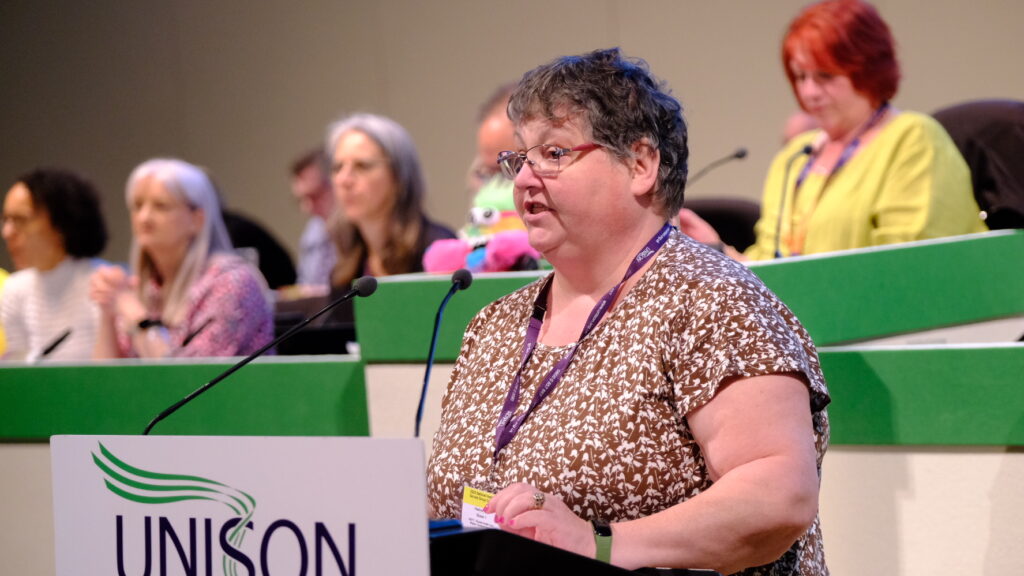
The next motion which noted that, following a consultation spawned from a motion at last year’s conference, the general appetite for ‘calling time’ on the Pay Review Body (PRB) has been confirmed.
One delegate said: “You told us the PRB was discredited in the eyes of our members and ultimately this motion is about trust, who do you trust? Who do the members trust? Is it our union, or is it those members of the PRB? They’ve never cared for a person or looked after a person in need in their lives.
“No-one is pretending direct negotiations are going to be easy, but we take ownership and we rely on, and trust, ourselves. We get our best settlements when we lead, when we take our members and negotiate directly. Our future decisions on pay should be decided by us.”
He highlighted the failures of the PRB recently including: in 2022 recommending a £1400 pay rise with inflation at 13%; and in 2021 the PRB report saying “Agenda For Change terms do not reflect the realities of nursing, preparing the ground for a nursing only pay spine.”
Speaking of Scotland’s experience building a collective bargaining position and direct negotiation relationship with the government in Holyrood, Heather Kelly (pictured above) told delegates: “There is nothing to fear from calling time on the PRB – if we are truly serious about collective bargaining – we need to get serious and get serious now.”
The motion endorsed UNISON’s ten-point plan as set out in the report ‘Our pay, Our say’ with an end goal of collective bargaining on annual pay awards within each of the UK administrations.
The NHS is One Team – no separate pay spine for nurses
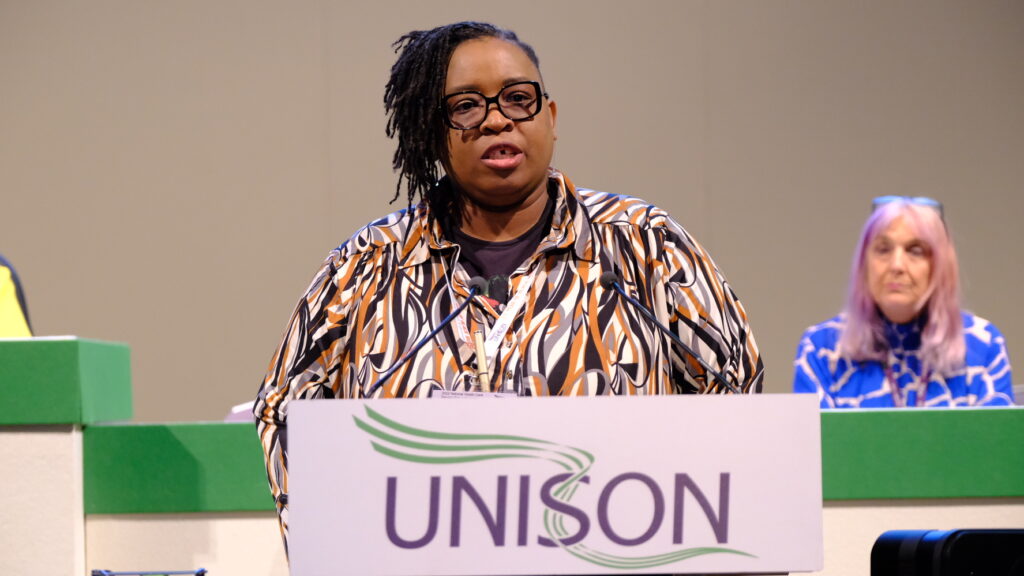
The debate on pay finished with a rousing debate on the motion – The NHS is One Team – no separate pay spine for nurses. The motion referenced the government commitment to the Royal College of Nursing to consider a separate pay spine in England for nursing staff exclusively and “opposes the creating of a separate pay spine.”
Gamu Nyasoro (pictured above) moved the motion saying: “The media has managed to portray the NHS as only doctors and nurses – but we know better.”
She told conference a personal story of taking her son to the hospital when he was 18 months old, and the huge variety of workers she met on that trip. Doctors, nurses, porters, security staff, radiologists, cleaners, health care assistants and many more. This, for her, embodied UNISON’s One Team belief.
Ms Nyasoro continued, moving onto the recent pay dispute, “After weeks of pay negotiations, imagine our surprise when the government announced they were pursuing further negotiations with just one of the unions.
“It’s simply a tactic to divide and conquer and break up collective bargaining. Conference lets put a stop to this Brexit for nurses. Lets show the government they will not break us, we are one team.”
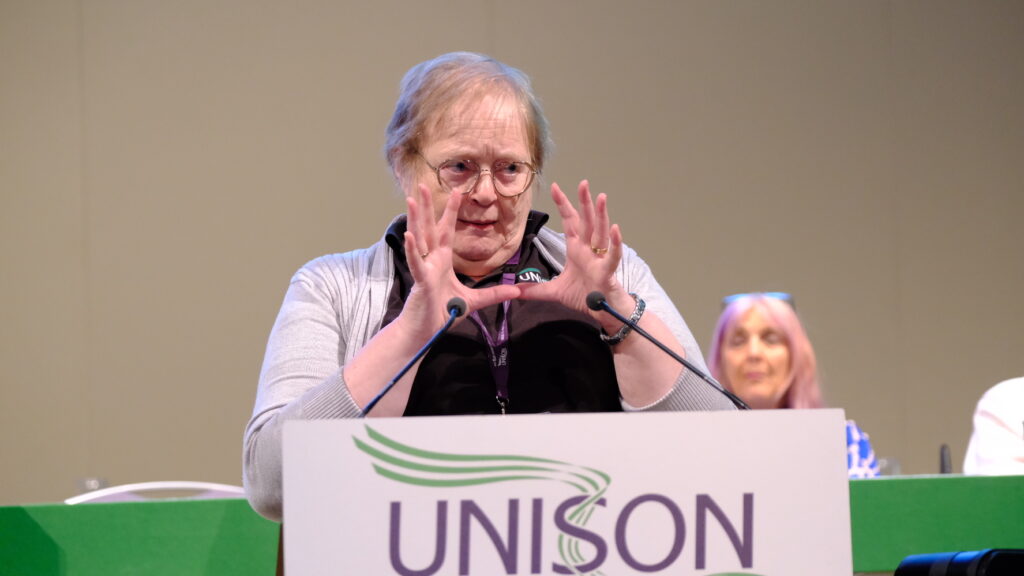
Anne Cherry (pictured above) of the Northern health and community branch told conference “I’ve been a nurse for 40 years, always in unions that stand for all health staff.”
She continued: “Across the cover of the old, little blue COHSE rulebook I remember it said. ‘All for one, one for all’.
“We certainly weren’t The Three Musketeers, but we meant it. Delegates have spoken elegantly about one team in this conference and we must stand together in support of that.”
Trudie Martin, chair of the nursing and midwifery occupational group, told delegates: “We understand that our strength comes from our unity and we will not stand by and be divided from our colleagues.”
She called the proposals “completely unworkable” and a distraction and said: “ We cannot tolerate this proposal to divide and rule. Let’s defeat this proposal, grow our nursing family work to strengthen agenda for change as One Team.”
The motion called on the SGE to work collectively with other unions to reject proposals for a nurses only pay spine and to highlight the danger of dismantling the harmonised pay spine.
The article Health conference debates pay first appeared on the UNISON National site.





